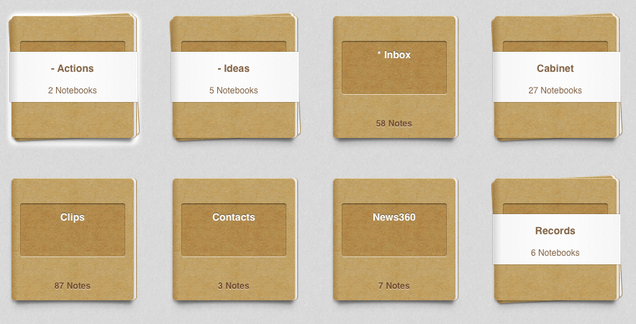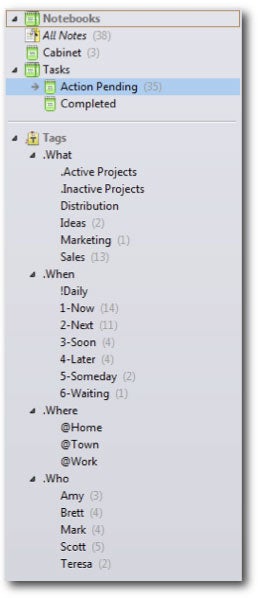
Dear Lifehacker,
It seems like everyone is always raving about Evernote, but I don’t really understand its appeal. Isn’t it just a notes app that other apps do better or simpler? What’s makes Evernote so great?
Signed,
Just don’t get it
Dear Just,
You’re not alone. I think the world might be divided into two groups: Those who love Evernote and those who don’t (or, at least, don’t understand why so many people love Evernote). Evernote is a cross-platform app that serves many purposes—it can be your digital file cabinet, note-taking tool, daily journal, task or project management system, recipe-keeper, and more. Because it has so many uses and different features, Evernote can both appeal to a lot of people and feel like overkill to others. (Our own Adam Pash has written about why he can’t get into apps like Evernote because he prefers apps that do just one thing well.)
Although few other Lifehacker editors use the app, many How I Work guests and Lifehacker readers also love (and I mean love) Evernote. Heck, I use it myself. We asked our Evernote fans why they loved it so much, and here’s what they said.
It’s a Universal Inbox: Store Anything You Can Imagine in One Place

Evernote integrates with just about everything. It has browser extensions that allow you to save a web page—in its entirety—in one click for future reference. A dedicated Evernote email address lets you forward emails, tweets, or any other type of content to any of your Evernote notebooks. Also, IFTTT (If This Then That) support means you can automatically send content from other services (e.g., Gmail or Google Reader or Pocket) to your Evernote account. If nothing else, you could use Evernote to archive your digital life.
Evernote can thus serve are your “everything” inbox. Thanks to its cross-platform support (desktop apps, web apps, mobile apps) you really can offload all of your reference materials, ideas, to do tasks, or other digital items to Evernote and never worry about where you’ve collected all those random bits of information. It’s one container to store them all. Evernote’s search is good enough that you can retrieve all those docs quickly, but it also has great notebook and tagging organization (more on that in a bit) that really make it stand out.
Jay G. says:
I use Evernote for EVERYTHING. I use it for my daily journal. I use it with IFTTT to save all starred items in Google Reader to save interesting articles for future reference. I scan all donation and other important receipts by scanning and emailing. I use it to organize projects with quotes, ideas, snippets from the web, and typed notes. I use it to store all digital manuals and instructions for various electronics around the home. I also use it to save favorite tweets (again with IFTTT). I use it to store teaching notes, discussion ideas, etc. I use it to reference personal documents, contracts, medical documents, etc.
That’s just off the top of my head, but these would be the most common uses. I am a Pastor of a church and I find this tool indispensable.
Chris K. writes:
I use Evernote every day. I’m a consultant and often meet with clients to discuss designs. It may be weeks or months in between meetings. Evernote makes it easy to catch right back up where we left off. By synching between my MAC and my Droid I can even get caught up while I’m waiting in the lobby 5 minutes before a meeting. And I can share the notes with my peers.
Basically, you can dump everything in there—from written or typed notes to photo snapshots or videos to voice recordings—and count on retrieving them later either with the reliable search or your own tagging/notebook organization.
It’s Digitizes Your Physical Notes and Backs Them Up in The Cloud
Because of its multi-platform support and OCR feature, Evernote also helps people who just want to go paperless. Mike U. says:
I can answer it simply that it helps the unorganized get organized.
Being an Evernote premium subscriber, I use the additional upload capacity to scan receipts, bills and letters, share household notebooks with my spouse, scan our kids artwork and tag it with date/event/grade. Additionally, I use it as a repository for documentation (read:work) in searchable PDF format.
It is totally the one tool I use every day multiple times a day.There has been numerous times I’ve been on a call and needed something like insurance information, and it was easily retrieved, because everything goes into Evernote.
Evernote can quickly turn photos and scanned pics into notes—and also decipher the text in those photos. (The Evernote Smart Notebook by Moleskine is a nice marriage of the analog and digital.)
It’s Great for Task/GTD Management
Productivity consultant Daniel Gold says he uses Evernote as a “life management tool”:
It allows me to leverage it as a document management tool to incubate all my reference related materials (both scanned papers and electronic) with my action items. With note linking, I can connect the dots between tasks and reference items. Add in saved searches and I can quickly filter through projects and tasks to focus on what must absolutely go right in order for me to be more productive & successful.
Even though Evernote lacks the typical trappings of a to-do list manager (e.g., reminders and checkboxes), it can be a worthy replacement if you set up a system for using it.

Evernote templates make it easy to turn Evernote into a project/GTD tool, but perhaps the most thorough GTD Evernote system is previously mentioned The Secret Weapon. TSW takes advantage of some of Evernote’s unique features: multiple tags selection (e.g., quickly find: “.Active Project,” “2-Next,” “@Work”) and email integration.
Whether you use a structure like The Secret Weapon with Evernote, Evernote could manage your tasks and projects, thanks to the easy email integration, tagging capabilities, and also notebook sharing (for collaborative project management).
It Rocks for Note-Taking, Whether Simple or Detailed
A lot of people also use Evernote as a note-taking tool and for studying or reading. The app has built-in audio capture support and integrates with tools like the LiveScribe digital pen (great for students and constant meeting attendees).
Personally, I find the note-taking to be a bit slow and cumbersome on Evernote. If I want to just quickly jot a note down, it’s not the best tool for the job (except for the fact that it’s a great universal inbox, as above). I think this sort of dissatisfaction with easy note-taking and syncing is why a lot of Lifehacker editors have resorted to simpler solutions like using plain text files and Dropbox. (I’m defaulting to index cards.)
Still, Lifehacker reader feedback suggests many of you are also using Evernote not just as a digital file cabinet but as a digital notebooks or notepads. Nathan A., a graduate research student in chemistry at the University of York (UK), uses Evernote as an electronic lab notebook:
Each experiment I do has a dedicated note for it, and on the note I note down the COSHH/risk assessment information, safety procedures, procedures and any references I’ve used. … After the experiment, I copy up my observations, measurements etc from the lab book into the Note. This is great as it means I can write my reports with full access to my notes, and easily share a copy with my Academic or the rest of the research group.
It might sound a little laborious, but it ensures a contaminant-free ‘paper trail’ and it makes writing reports up a whole lot easier.
Matthew B. uses it to quickly note milestones in his son’s life. And Zef C. uses Evernote to jot down recipe ingredients.
Many readers said they liked Evernote’s ability to not only sync across all devices and organize with tags, but preserve the note creation date. And Grad student Andy K. says Evernote comes in handy when you have to compile multiple media formats into one cohesive format. (Also, did we mention it was free for all this multimedia archiving/recording goodness?)
It Works as a Digital Reference System, Great for Research Work or Archiving Material
I use Evernote as a digital file cabinet and also as a place to offload and organize ideas. The web clipping browser extension works really well (although sometimes it makes me wait longer than I want to). Instead of saving just the URL, like Springpad does, Evernote saves the full article and the URL—which is great for reference purposes. With multiple tags selection and the ability to link notes together, Evernote is the ultimate reference system. As frequent Lifehacker contributor Shep McAllister says, it’s great for doing research and highlighting how different things are connected.
It Allows for Multiple Special Notebooks
You could put Evernote to any task that involves archiving, journaling, or otherwise recording information.
Adam R. says:
Evernote is perfect for a beer drinking history of the different microbrews I have had. I include pictures of each bottle or glass of beer along with tasting notes for each one.
I also use it for work items I need with me everywhere I go, including IP addresses, network ID’s and server names. Easily searchable and hasn’t failed me yet.
Others use Evernote to preserve their:
- Meeting notes
- Client/project notes
- Home contractor phone numbers
- Songs (chords, tablature, etc.)
- Technical knowledgebase
- Travel plans
- Motivational quotes
- Usernames and passwords (I might think twice about that)
- Recipes
- Important (e.g., kids’ medical) documents
- Bucket list
There are many other ways to record information, but perhaps really none as feature-rich and universally accessible as Evernote. There are tons of plugins for Evernote too, so you can pretty much mold it to your exact needs.
Those are the main reasons/ways all of us are using Evernote. It’s not without its flaws (Alexio R. has a love/hate relationship with the app because of its automatic formatting), but it’s like the Swiss Army knife of capture tools.
Love,
Lifehacker
Original Article by Melanie Pinola







